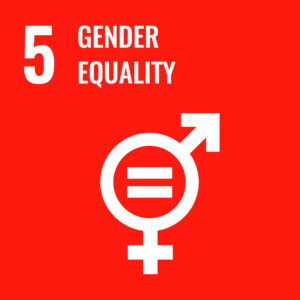SDGs – Gender Equality
Purpose Of SDGs
SDGs Purpose
Gender Equality

Gender is the differentiation of roles, attributes, traits, attitudes and behaviors that grow and develop in society. And gender roles are divided into productive roles, reproductive roles and social roles.
The word gender can be interpreted as the roles formed by the community and the behavior that is embedded through the socialization process related to the gender of women and men. There are biological differences between women and men—but culture interprets these biological differences into a set of social demands about appropriateness of behavior, and in turn rights, resources and power. While these demands vary by society, there are some striking similarities. For example, almost all community groups hand over responsibility for child care to women, while military duties are assigned to men. Like race, ethnicity, and class, gender is a social category that largely determines a person’s way of life and participation in society and the economy. Not all societies experience discrimination based on race or ethnicity, but all societies experience discrimination based on gender—in the form of inequalities and differences—to varying degrees. It often takes a long time to change this injustice. This atmosphere of injustice can sometimes change drastically due to socio-economic policies and changes.
The definition of gender equality refers to an equal condition between men and women in the fulfillment of rights and obligations.
Discrimination based on gender still occurs in all aspects of life, all over the world. This is a fact despite considerable progress in gender equality today. The nature and extent of discrimination vary widely across countries or regions. There is not a single region in a third world country where women have enjoyed equality in legal, social and economic rights. Gender disparities in opportunity and control over resources, the economy, power, and political participation are ubiquitous. Women and girls bear the brunt of the inequalities that occur, but basically inequality is detrimental to everyone. Therefore, gender equality is the main issue of a development goal that has its own value.
Gender equality will strengthen a country’s ability to develop, reduce poverty, and govern effectively. Thus promoting gender equality is a major part of a development strategy in order to empower people (everyone)-women and men-to lift themselves out of poverty and improve their standard of living.
Economic development opens many avenues for improving gender equality in the long term.
The Sustainable Development Goals Agenda has an important meaning because once it is adopted it will be used as a global and national reference so that the development agenda becomes more focused. Each of these goals is to uphold Human Rights (HAM) and to achieve gender equality and empower women, both young and old.
Address & Contact
BOGOR CAMPUS – Jl. Raya Pajajaran, Bogor City, West Java 16128
SUKABUMI CAMPUS – Jl. Sarasa No. 45, Babakan, Cibeureum District, Sukabumi City, West Java 43142
- (0251) 8376845
- sv@apps.ipb.ac.id

